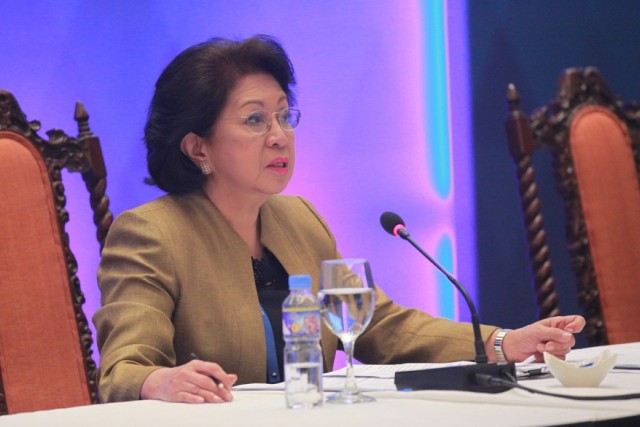Ombudsman backs easing of wiretap law

Ombudsman Conchita Carpio-Morales said the anti-graft agency wants a more relaxed version of the law that would aid in the investigation and prosecution of erring public officials. APEC
MANILA, Philippines – The Office of the Ombudsman has expressed support for proposals in Congress to amend the Anti-Wiretapping Law.
Ombudsman Conchita Carpio-Morales said the anti-graft agency wants a more relaxed version of the law that would aid in the investigation and prosecution of erring public officials.
“Of course, we also advocate legislative reforms to strengthen our resolve to choke impunity. We’re trying to see to it that we can modify the Anti-Wiretapping Law so we can probably use wiretapping without violating constitutional rights,” Morales said in an anti-corruption forum held recently in Quezon City.
Morales pointed out that wiretapping could be a useful investigative tool for cases of graft and corruption. But the hands of investigators are tied because the current law considers wiretapping under most circumstances as a criminal act as it supposedly infringes on the constitutional right to privacy of communications and the right against unreasonable searches and seizures.
Morales stressed a more liberal Anti-Wiretapping Law would expand the investigative power of the ombudsman, including the power to open bank accounts of individuals subject in the probe.
Morales said Congress must amend not only the Anti-Wiretapping Law but also Republic Act 6770 or the Office of the Ombudsman Act of 1989 as well as Republic Act 1405, also known as the Bank Secrecy Law.
Morales said she is also pushing for the passage of a bill that would give investigators and prosecutors of the ombudsman immunity from criminal, administrative or civil suits arising from their mandate and regular exercise of official functions.
“We want to see to it that our investigators should also be given immunity from false accusations in order to discourage them from doing what is expected of them,” she said.
There are bills pending in both the Senate and the House of Representatives seeking to relax the half-century-old Anti-Wiretapping Law.
- Latest
- Trending




























